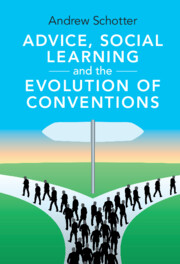Book contents
- Frontmatter
- Dedication
- Brief Contents
- Contents
- Figures
- Tables
- Preface
- 1 Introduction
- Part I Background
- Part II Coordination, Distribution, and Trust Conventions
- Part III The Impact of Public Advice and Common Knowledge
- 7 The Impact of Private and Public Advice in the Minimum-Effort Game
- 8 Advice and Common Knowledge in the Two-Thirds Guessing Game: Does Advice Increase Strategic Sophistication?
- Part IV The Value of Advice
- Part V Advice and Economic Mechanisms
- Index
8 - Advice and Common Knowledge in the Two-Thirds Guessing Game: Does Advice Increase Strategic Sophistication?
from Part III - The Impact of Public Advice and Common Knowledge
Published online by Cambridge University Press: 09 March 2023
- Frontmatter
- Dedication
- Brief Contents
- Contents
- Figures
- Tables
- Preface
- 1 Introduction
- Part I Background
- Part II Coordination, Distribution, and Trust Conventions
- Part III The Impact of Public Advice and Common Knowledge
- 7 The Impact of Private and Public Advice in the Minimum-Effort Game
- 8 Advice and Common Knowledge in the Two-Thirds Guessing Game: Does Advice Increase Strategic Sophistication?
- Part IV The Value of Advice
- Part V Advice and Economic Mechanisms
- Index
Summary
A reading of the literature on cognitive hierarchies leaves the impression that a subject’s type is predetermined before she comes into the lab so that the distribution of types is exogenous and immutable across games. In this chapter we view the choice of a person’s cognitive level as endogenous and explain it by focusing on subject’s ’expectations about the cognitive levels endogenously chosen by others. We run a set of experiments using the two-thirds guessing game where subjects receive public advice offered by a set of advisors. We discover that certain types of public advice, those that are commonly interpreted as meaningful, are capable of shifting the distribution of observed cognitive types, indicating that the distribution is endogenous.
- Type
- Chapter
- Information
- Advice, Social Learning and the Evolution of Conventions , pp. 214 - 240Publisher: Cambridge University PressPrint publication year: 2023

